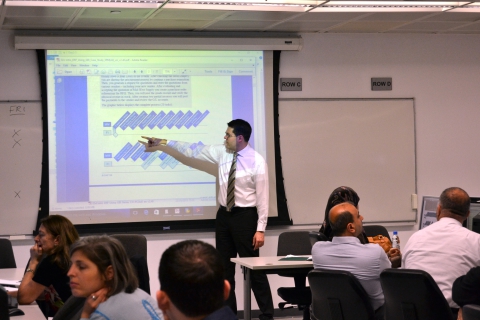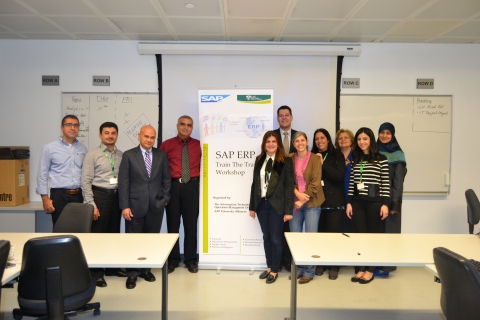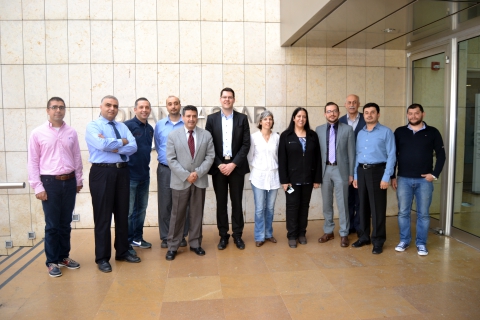Technology in Business: Exposure to Enterprise Resource Planning
One-week workshop introducing the SAP ERP system.
Fostering advancement has always been on top of AKSOB’s priorities in providing quality education. In accordance, the Department of Information Technology and Operations Management, the focal point of innovative and technological initiatives, organized a training workshop on the Enterprise Resource Planning (ERP) software at the School, from April 11 to April 15, in collaboration with the SAP University Competence Center at the University of Magdeburg, Germany, as part of the SAP University Alliances program.
SAP is a leading German software company whose primary aim is to provide business solutions and enterprise planning systems for optimal business performance – their ERP software is a business management system of integrated applications used to collect, manage and store data from the different functions of a business, to simplify interpretation and decision making.
Dr. Stefan Weidner, commercial head and coordinator at the University Competence Center, initiated the workshop on the first day with a presentation introducing SAP, Global Bike Inc. – the integrated model company of SAP used for training on the system —ERP navigation and general SAP concepts.
The sessions on the following days were dedicated for exercises and case studies, each day handling a business function, namely, finance and accounting management, distribution, sales and marketing, in addition to insights on in-memory databases, business process modeling and mobile application data.

When asked about the advantage of the SAP ERP system, Weidner explained that it was differentiated by its understanding of business processes, as opposed to other systems that were database-oriented, thus too technical for connecting business functions. “If companies only look at the technical layer, they may miss out on the business process details, whereas the SAP is in “the heart” of the business process. This system is easier and more decisively integrated into all of the companies’ processes,” he continued.
The main aim of the trainings organized all over the world, according to Weidner, is to educate universities and faculty members about the ERP system which is intended to efficiently support companies in their different business processes. “The goal is primarily to introduce the ERP system to university professors who in turn will guide students and show them the importance of using such systems, in addition to databases.”

In turn, Dr. Manal Yunis, assistant professor of ITM, informed us that one of the purposes of organizing this workshop for faculty at LAU was to raise awareness on how to incorporate ERP in the curriculum, basically for ITM and all over the School.
“Teaching students the basic functions in ERP would enhance the students’ marketability and employability. If the system is to be included in most of the courses, especially accounting, marketing, HR and ITM, then this will give students good exposure to real-life business, enhance their ability to understand the interdependence of the various organizational functions and prepare them better to their future jobs. The ERP material will also support courses like Business Intelligence and Data Analytics, and will pave the way for future practical courses related to supply chain management and customer relationship management,” she said.
The importance of the ERP system lies in its ability to link all the different business functions in a given company, leading to a homogenous performance.
This claim was also backed by Dr. Abbas Tarhini, assistant professor of ITM. “SAP is a very important system because it integrates the functionalities of the business process.”
He added, “One of the very good things about the workshop was that more than one department was involved. Instructors from all of the departments at the School were there. The workshop was not only targeted at the business school but at departments on the university level as well.”

The feedback from faculty members who attended the sessions confirmed the advantage and usability of the system in their relevant fields.
Dr. Jordan Srour, assistant professor of operations management, confirmed how beneficial it was to become skilled at using the software. She added, “Dr. Weidner was extremely good at delivering the material in the sessions. He was able to answer all questions related to the software, pedagogy and soft or hard skills.”
Ms. Janine Zakka, instructor of accounting, also expressed her contentment with the training, as it stressed on all matters in accounting. “We teach students general entry and the ledger; these were included. But over and above, the documents from where to get the information to report these entries were also included. This is very good for the students because this shows how these accounts are actually accumulated and where to get the data.”
Zakka believed that if students would know how to add and report the proper data, then the financial statement would come out automatically.
Marketing is also taken into account in ERP. As Dr. Hossein Eslami, assistant professor of marketing, who had prior knowledge of the system, told us, “I got to know the SAP software and particularly what sources they use in the whole database because, eventually, we will be using those data sets for our analysis. It is beneficial to learn the structure and source of data they have. Plus they introduced a software data analytics part, which I can use in my marketing analytics course.”